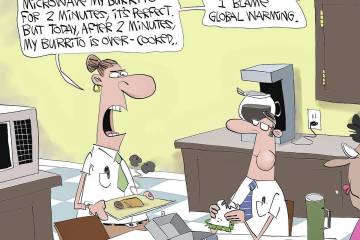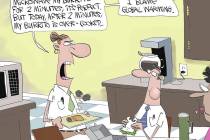Your political views and where you get your news
You are what you eat and then excrete.
It's long been a postulate of politics that one's place on the political spectrum can be determined by one's choice of medium for news. Radio listeners are Bible-clinging, gun-toting tea partiers. Internet users are knee-jerk liberals with socialist tendencies. Newspaper readers are level-headed, inquisitive and rational independents.
The latest political poll conducted for the Review-Journal by Mason-Dixon Polling & Research would appear to support this conclusion.
For the first time, we asked pollster Brad Coker to ask a demographic question about where Nevadans get their news.
The sad news is that most people in Nevada, like those nationwide, still claim television as their main source of news, primarily because the set is on and some news rolled by at some point. The breakdown was television, 53 percent; Internet, 23 percent; newspaper, 18; radio, 4; other or not sure, 2. Those under 35 claimed to get more news from the Internet than TV, and those over 50 were more likely to read newspapers.
Probably the most on-point question asked as it relates to political attitudes was whether one approved or disapproved of the recent Tea Party rally in Searchlight, the hometown of Senate Majority Leader Harry Reid. While just more than half of those who watched TV, perused the Internet or read newspapers approved, those who get their news from the radio approved by a whopping 75 percent.
Granted, that's a small number of people, and the margin of error is considerable, but that swing is telling.
Pollster Coker estimated the margin of error for the radio-listening respondents would be about 20 percentage points, but he agreed the significance of the gap in responses more than covers the spread.
There was a similar swing when it came to a question about supporting or opposing the health insurance regulations just passed by Congress and signed into law by President Obama. Opposition hovered around 50 percent for all but those radiophiles -- of whom 80 percent opposed it.
When it comes to party politics, it appears those Internet surfers reveal their Democrat leanings, largely, I suspect, because they tend to be younger. Coker agrees. "Internet leans slightly left, but that is clearly age driven." (You know what they say: If you are 30 and not a liberal, you have no heart. If you are 60 and are not a conservative, you have no brain.)
In a hypothetical general election race pitting Democrat Sen. Reid against Republican Sue Lowden and Tea Party candidate Scott Ashjian, those Interneters were the only ones who chose Reid, 42 to 39 over Lowden. All the rest went with Lowden: TV, 45-39; newspaper, 52-34; radio, 75-15. Ashjian got no more than 6 percent from any segment.
When you put in Danny Tarkanian instead of Lowden as the GOP nominee, the TV folks swing to Reid, too, 38-36, and the radio listeners lifted Ashjian to 15 points.
Similar leanings were found in the gubernatorial race.
A telephone survey by a couple of University of Missouri-Columbia School of Journalism professors five years ago found radio listeners were the most polarized in their political views, and newspaper readers the least polarized.
"Since newspapers do not have the same space and time constraints as television or radio, newspapers are able to provide readers with more information on both sides of an issue," the report said. As a result of this, professor Wayne Wanta said readers are less likely to adopt extreme attitudes about certain issues. As for radio, they blamed the usual suspects, Rush Limbaugh and his ilk.
To see all the results for the Mason-Dixon media subset of this past week's poll results go to www.lvrj.com/polls_news. Yes, radio listeners, that is on the Internet. And for those of you who read newspaper news on the Internet, the next time a pollster asks, just say newspapers, because that is where the vast majority of Internet "news" comes from.
Thomas Mitchell is editor of the Review-Journal and writes about the role of the press and access to public information. He may be contacted at 383-0261 or via e-mail at tmitchell@reviewjournal.com. Read his blog at lvrj.com/blogs/mitchell.




























